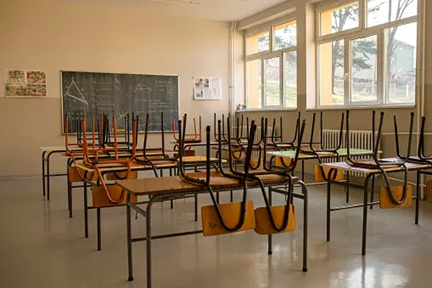Ohio sets goals to attack school absenteeism – By Susan Tebben, Ohio Capital Journal
A task force made up of school district representatives, advocacy groups and even juvenile court staff released recommendations on how the state of Ohio can improve student attendance.
The group, who worked with members of the Ohio Department of Education and Workforce as well, said chronic absenteeism was “a growing issue” before the COVID-19 pandemic hit, but only worsened with the pandemic’s forced school closures and other issues.
“Attendance is a crisis in Ohio,” the group said in its final report, released this month. “While the number of chronically absent students declined slightly last school year, there is much more urgent work to do.”
Chronic absenteeism is defined as having missed 10% all overall school hours, no matter what the reason is for the absence.

Kansas, Nebraska universities to collaborate on adding teachers of color in public schools – By Tim Carpenter, Nebraska Examiner
TOPEKA — A three-year, $3.9 million federal grant will enable Kansas State University and University of Nebraska-Lincoln to collaborate on a project to diversify the teacher workforce in the Dodge City, Kansas, school district and five school districts in Nebraska.
The initiative to increase the number of teachers of color serving culturally and linguistically diverse students is part of Project RAÍCES, which is Spanish for roots. It’s the acronym for Reenvisioning Action and Innovation Through Community Collaborations for Equity Across Systems.
“Not only is the concept behind Project RAÍCES powerful, but it’s the combined richness of the intent of all of our vested partners — and what this means for students and these communities — that truly reveals the potential impact,” said Debbie Mercer, dean of the College of Education at K-State.
Participating districts in Nebraska are Columbus, Lincoln, Schuyler, South Sioux City and Wakefield. Those districts have minority enrollments ranging from 39% in Lincoln to 80% in Schuyler and South Sioux City.

As CT kindergarten age changes, worries about transition emerge – By Jessika Harkay and Erica E. Phillips, CT Mirror
Beginning next fall, Connecticut will join the majority of other states in requiring children to be 5 years old before enrolling in kindergarten in September 2024.
But while there’s strong support for that age requirement among educators and developmental experts, the state’s transition to the new system has generated a flood of questions and concerns.
Lawmakers approved the measure during the 2023 legislative session. Under the new law, children entering kindergarten will need to have turned 5 years old by Sept. 1. The previous cutoff was Jan. 1.
That means about a third of all kids born in 2019 will have to wait a year longer to enter primary school or will have to apply for a waiver. That’s left families, school district leadership and many in the child care sector — even those who agree with the developmental reasons for the change — scrambling to get things in order.

How Michigan teacher evaluations would change under proposed reforms – By Hannah Dellinger, Chalkbeat Detroit
Proposed legislation in Michigan that would eliminate student test scores as a factor in teacher evaluations would represent a victory for teachers if it passes, and a turnabout in an education reform effort that began nearly a decade ago.
Current state law requires that student scores on standardized tests count for 40% of a teacher’s performance rating. Under two proposed bills that passed the Senate last week, that requirement would go away, and the districts would be able to use their own criteria for evaluating teachers, such as classroom observations, samples of student work, rubrics, and lesson plans.
The bills would also de-emphasize evaluations as a factor in districts’ decisions to fire or demote teachers or deny them tenure. But they would require districts to take action against teachers who don’t improve after repeated interventions.
The House Education Committee is expected to take up the bills on Tuesday.











